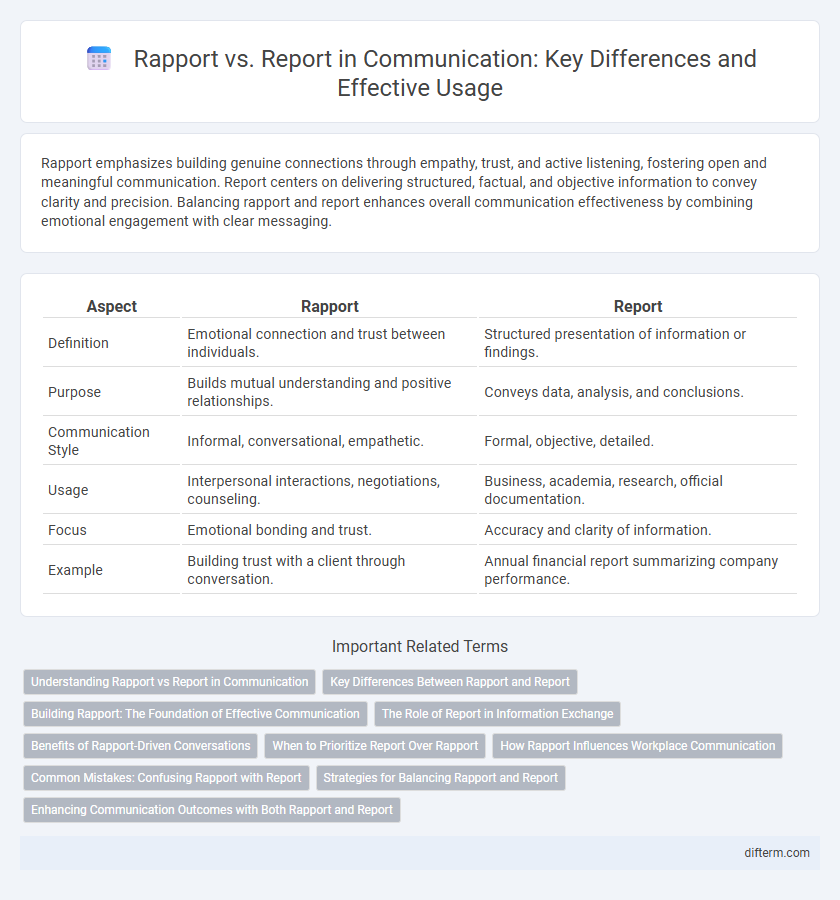Rapport emphasizes building genuine connections through empathy, trust, and active listening, fostering open and meaningful communication. Report centers on delivering structured, factual, and objective information to convey clarity and precision. Balancing rapport and report enhances overall communication effectiveness by combining emotional engagement with clear messaging.
Table of Comparison
| Aspect | Rapport | Report |
|---|---|---|
| Definition | Emotional connection and trust between individuals. | Structured presentation of information or findings. |
| Purpose | Builds mutual understanding and positive relationships. | Conveys data, analysis, and conclusions. |
| Communication Style | Informal, conversational, empathetic. | Formal, objective, detailed. |
| Usage | Interpersonal interactions, negotiations, counseling. | Business, academia, research, official documentation. |
| Focus | Emotional bonding and trust. | Accuracy and clarity of information. |
| Example | Building trust with a client through conversation. | Annual financial report summarizing company performance. |
Understanding Rapport vs Report in Communication
Rapport in communication refers to the harmonious connection and mutual trust established between individuals, enhancing empathy and active listening. Report focuses on the structured exchange of information, emphasizing clarity, facts, and logical organization. Effective communication balances rapport for emotional engagement with report for information accuracy and coherence.
Key Differences Between Rapport and Report
Rapport involves building mutual trust and emotional connection through empathy, active listening, and nonverbal cues, fostering a collaborative communication environment. Report centers on structured, factual communication aimed at delivering information clearly and objectively, often used in formal or professional contexts. Key differences lie in rapport's emphasis on relational bonding versus report's focus on information accuracy and clarity.
Building Rapport: The Foundation of Effective Communication
Building rapport is crucial for effective communication because it establishes trust and emotional connection, fostering open dialogue and mutual understanding. Unlike report, which focuses on data and factual exchange, rapport emphasizes empathy, active listening, and nonverbal cues to create a comfortable environment. Developing strong rapport enhances collaboration, reduces misunderstandings, and improves overall communication outcomes.
The Role of Report in Information Exchange
Report plays a crucial role in information exchange by structuring data into clear, objective formats that facilitate precise understanding and decision-making. Unlike rapport, which builds emotional connections, report ensures that information is accurately conveyed through documented facts, statistics, and formal language. Effective use of report enhances transparency and accountability in professional and organizational communication.
Benefits of Rapport-Driven Conversations
Rapport-driven conversations enhance trust and foster deeper connections between participants, leading to more open and honest communication. These interactions encourage empathy and understanding, which improve collaboration and conflict resolution in both personal and professional settings. Strengthening rapport boosts engagement and creates a foundation for long-term relationship building that supports effective information exchange.
When to Prioritize Report Over Rapport
Prioritize report over rapport in situations requiring clear, concise information delivery, such as during formal presentations, technical briefings, or legal discussions. When accuracy, data integrity, and factual analysis are critical, emphasizing report ensures essential details are communicated effectively. In high-stakes decision-making processes, focusing on report minimizes misunderstandings and supports objective evaluation.
How Rapport Influences Workplace Communication
Rapport significantly enhances workplace communication by fostering trust and open dialogue, which leads to more effective collaboration and conflict resolution. Establishing rapport creates a supportive environment where employees feel valued and understood, increasing engagement and productivity. Unlike report, which focuses on data transmission, rapport emphasizes emotional connection, making communication more meaningful and impactful.
Common Mistakes: Confusing Rapport with Report
Confusing rapport with report often leads to ineffective communication, as rapport emphasizes emotional connection and trust-building, while report focuses on factual information exchange. A common mistake is attempting to establish rapport by simply delivering a report, which can create distance rather than closeness between individuals. Understanding the distinction enhances interpersonal interactions, fostering both genuine relationships and accurate information sharing.
Strategies for Balancing Rapport and Report
Balancing rapport and report requires blending empathetic listening with clear, factual communication to foster trust and understanding. Effective strategies include mirroring emotional tone while delivering concise information, asking open-ended questions to encourage dialogue, and adapting language complexity to the audience's needs. Prioritizing both emotional connection and data accuracy enhances collaboration and decision-making.
Enhancing Communication Outcomes with Both Rapport and Report
Effective communication hinges on balancing rapport, the emotional connection built through empathy and active listening, with report, the logical exchange of information and facts. Developing strong rapport fosters trust and openness, while maintaining report ensures clarity and precision in message delivery. Integrating both elements enhances understanding, reduces misunderstandings, and drives positive communication outcomes.
rapport vs report Infographic

 difterm.com
difterm.com